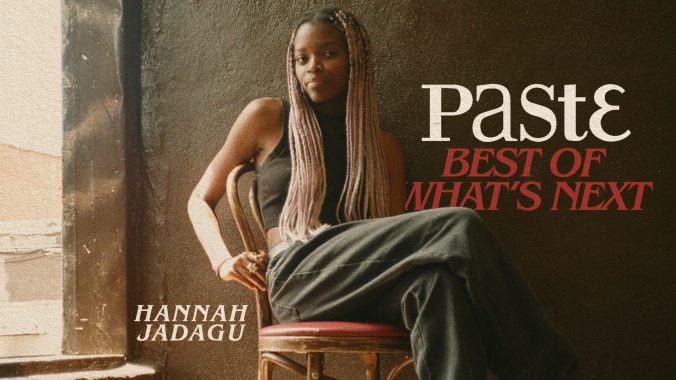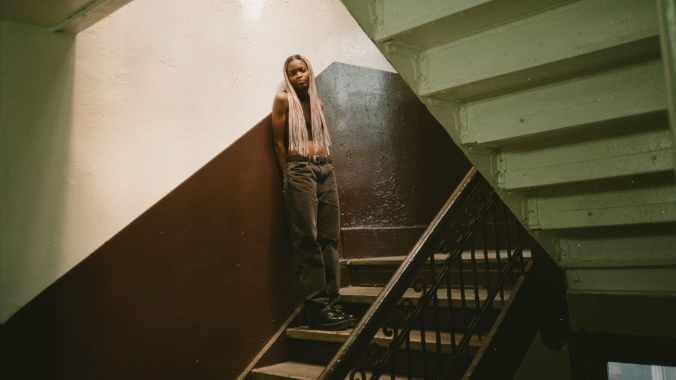Best of What’s Next: Hannah Jadagu
Photos by Sam Wilbert
To be direct in our communication with others is often a misunderstood approach. When we deliver sharp, necessary truths and leave dead air to hold the space that follows, it’s perceived as being rude or abrupt, but both parts of that interaction serve their own purpose: If the spoken statement cuts down to the bone, all of the unspoken emotion which prompted its delivery hangs in the surrounding silence. In singer/songwriter Hannah Jadagu’s case, she fills that silence with layers of MIDI instruments and echoing guitar melodies, as if she’s aware of how her swift and punishing lyrical turns need to be softened by noise that will express the teary-eyed motivation behind it. It’s in the riff which bolsters the damning shock of repeating “I know what you did” over and over again. It’s in the beat looping beneath the confession of “I don’t wanna work this out.” It’s in the keyboard line layered over the finality of “Am I supposed to say I don’t care? / ‘Cause I’ll turn my back / Now you’re faced with that.”
That last line appears at the beginning of “Warning Sign,” the third single from Jadagu’s debut album, Aperture. It’s followed by a lyric even more brutally direct, if not more self-aware, barely softened by the airy sweetness of her voice: “Sorry if I’m being short / It’s just that I can’t stand to hear your voice / When it’s oh-so loud / Could you quiet down?” The rest of the track is peppered with woozy synths, an insistent drum beat and vocoder-drenched backing vocals, almost embodying the sensation of how overwhelmed Jadagu is by the situation she’s describing. If the sucker punch of a lyric is her shoving you back, the soundscapes it’s wrapped up in contain the universe of feelings you both might have in response to that action but don’t know how to voice. It’s the way your eyes water involuntarily in the aftermath.
“I think I am just obsessed with layers,” Jadagu says, calling from her dorm room at NYU, attempting to trace the origin of Aperture’s sound back to her earliest notion that she might have a knack for writing her own music. “I like loud, borderline-overstimulating stuff. It helps to create this blanket that my vocals can just move throughout. A lot of it is very instinctual. Luckily, the melody part is not difficult for me, so I think that just comes naturally.”
That natural impulse to write perfectly contained pop melodies is so intrinsic to the 20-year-old that she struggles to articulate how she even does it. To the best of her ability, she attributes that urge to create to her hometown of Mesquite, Texas—specifically, memories she made in the passenger seat of her older sister’s car. One landmark moment arrived when the Japanese House would come up in her sister’s musical queue; Jadagu felt something click within herself, as the magic of Amber Bain’s take on ambient pop poured out of the speakers. But she hid her gut reaction. “I would go home and search all of the lyrics because I didn’t want to ask my sister, ‘What are you playing?’” she laughs. “I was always hating! But the music felt so personal, while also sounding so heavy and full, and that really connected with me.”
That lyrical and sonic balance spurred Jadagu into action, leading her to “channel my love for music into making it, saying whatever came to mind and what felt true to me.” Inspired by Steve Lacy, she began recording songs using only her iPhone 7, uploading them to SoundCloud and attracting her own small following, as well as the attention of Sub Pop. Her first release on the label, 2021’s What Is Going On? EP—which was also recorded and produced entirely on her phone—received immediate critical attention. Suddenly, during a time when she thought she’d be prepping for her sophomore year of college, she was fielding offers to open for artists like Bartees Strange, Men I Trust and Faye Webster.
“The idea was: ‘I’m just gonna take the year off and do as many opening tours as I can and build a fan base,’” she recalls, admitting how unprepared she was for the disruptive challenges that come with being 19 under normal circumstances, let alone what happens when you’re traveling in a van across the country, isolated from people your own age. “I was trying to maintain relationships while being outside of school. The accessibility is stripped from you and you have to work 10 times harder to keep that going, especially when you’re on the road. You’re in Florida, your bestie’s calling you saying, ‘Where are you?’ and you haven’t spoken in two weeks. I was failing at maintaining those relationships, and I also found that they weren’t the best relationships to begin with. I don’t think I had the greatest boundaries for myself.”

It’s fitting, then, that the songs that came out of this time eventually formed the basis of Aperture—the title of which usually refers to the space inside a camera where light can pass through, allowing you to capture the image. By being able to preserve that precarious time in amber, you can gain perspective on what parts of the image still serve you while deciding to erase that which doesn’t. In Jadagu’s own words: “It’s about coming into your 20s and figuring out the people that you want in your life, and how you’re either going to get rid of those people or keep those people, and that sort of push and pull and what it takes and what it means.” Overwhelming life questions call for something to fill those overwhelming spaces you need to leave.
-

-

-

-

-

-

-

-

-

-

-

-

-

-

-

-

-

-

-

-

-

-

-

-

-

-

-

-

-

-

-

-

-

-

-

-

-

-

-

-








































